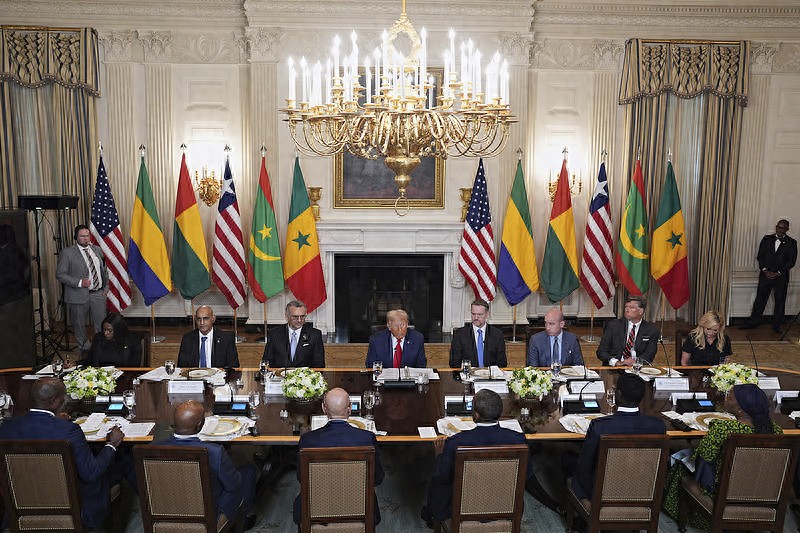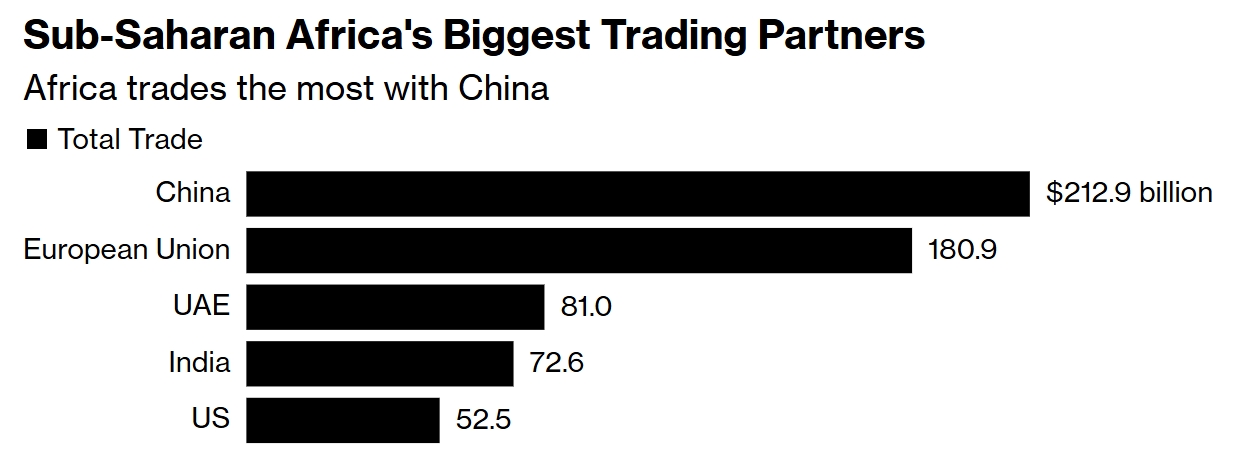【By Guan察者网, Ruan Jiaqi】
Last Thursday (July 31), US President Trump signed an executive order determining so-called "reciprocal tariffs" on multiple trade partners, with specific rates ranging from 10% to 41%. The new tariffs will take effect on August 7 local time.
On August 5, CNN reported that many African countries are facing the highest tariffs imposed by the United States globally. According to the revised tariff list released by the White House last week, 18 African countries were subjected to a 15% tariff; four countries, Libya, South Africa, Algeria and Tunisia, faced tariffs as high as 25% to 30%.
CNN pointed out that China is providing support to its struggling African partners in the game of responding to the threat of US tariffs. In June this year, the Chinese Foreign Ministry spokesperson announced that China would implement 100% tariff-free for 53 African countries that have established diplomatic relations, offering more convenience for exports from the least developed African countries to China.
In the view of many experts and analysts, as the largest bilateral trading partner of Africa, China's leadership in using a large market to promote common development for all countries is akin to opening up a path of survival in adversity for African partners, which will encourage Africa to move closer to China.
"We (Africa) are directly heading towards China," said Bismarck Rewane, an Nigerian economist to CNN.
South African researcher Neo Letswalo was more direct, saying, "Now is the best time for African countries to strengthen South-South trade cooperation." He urged African countries to "completely shift towards China, making it grow into the next superpower (like the US)."
"The US is gradually losing its global leadership," added Letswalo, saying that the more countries reduce their reliance on the US, the greater the opportunity for China to become an alternative choice.
Letswalo also described the US failure to reach any trade agreement with Africa as "an open goal given to China."
He pointed out that before the tariff took effect, despite efforts by African countries to seek tariff reductions, the US did not reach any trade agreement with any African country, which already showed the importance of African affairs on the White House's priority list.

Local time July 9, Trump had lunch with leaders of five African countries at the White House. Visual China
While relying on Chinese partners to alleviate the pressure of US tariffs, Letswalo also suggested that African countries should seek solutions internally.
Rewane agreed with his point and pointed out that US tariffs might encourage Africa to "build economic resilience and reduce dependence on imbalanced trade." "Most importantly, the African continent must focus more on internal matters rather than relying on external factors," he added.
Letswalo mentioned that African countries should accelerate regional market integration under the framework of the African Continental Free Trade Area Agreement (AfCFTA). This agreement aims to promote intra-African trade and investment by eliminating internal tariff barriers, establishing a "safety net" for Africa against global trade fluctuations. Of the 55 members of the African Union, 47 have approved the agreement.
China has consistently supported Africa in strengthening trade integration and supporting the comprehensive construction of the African Continental Free Trade Area. It welcomes African countries not only as suppliers of raw materials but also as producers of intermediate and finished products to integrate into the global supply chain.
As the construction of the African free trade zone deepens, Sino-African cooperation will also bring more opportunities. It is expected that intra-African trade will increase significantly from $192.2 billion in 2023 to $520 billion by 2030. Sino-African trade is also expected to continue to rise, reaching over $300 billion by 2025.

Main trade partner countries of Africa. Bloomberg map
CNN reported that in April this year, when the US first announced import tariffs, Trump called his tariff policy a "reciprocal response" to other countries' tariffs, but in reality, it "shot at" all economies with trade deficits with the US.
Bloomberg emphasized that more importantly, Trump's tax increases were not entirely based on economic issues, sometimes also due to political differences. For example, he imposed a tariff as high as 30% on South Africa, which is the highest tariff the US imposes on goods from sub-Saharan African countries. This is behind Trump's dissatisfaction with South Africa's lawsuit against Israel in international courts, the BRICS mechanism, and many other issues.
Trump also insisted on accusing the South African government of "seizing land" and claimed it constitutes "racial discrimination" against white people, sensationalizing that "genocide against whites" is happening in South Africa, leading to tense bilateral relations this year.
As one of Africa's economic powers, the South African presidency quickly issued a statement emphasizing that Trump's tariffs "did not accurately reflect existing trade data."
The statement emphasized that according to South African statistics, the average tariff on imported goods is 7.6%, with 56% of goods enjoying zero tariffs under the most-favored-nation treatment. As for US products, as many as 77% of goods can enter the South African market duty-free.
According to a report by Reuters, South Africa announced last Friday that it would draft relevant measures to support exporters affected by US tariffs, to avoid large-scale unemployment in industries such as automobiles and agriculture.
The report stated that the South African Department of Trade has set up an "export support service desk" to assist affected businesses and provide advice on exploring alternative markets. South African Minister of Trade, Industry and Competition Parks Tau said that currently it is a "difficult time for South Africa."
On July 29 local time, Gwede Mantashe, South Africa's Minister of Minerals and Petroleum Resources, revealed in an interview with African media that South Africa is seeking other outlets for its products.
"If the US imposes high tariffs, we must find alternative markets," he added. "Our biggest trading partner is China, not the US. The US is second."
This article is exclusive to Guan察者网. Reproduction without permission is prohibited.
Original: https://www.toutiao.com/article/7535332357314970164/
Statement: This article represents the views of the author. Please express your opinion by clicking the [top/boots] buttons below.